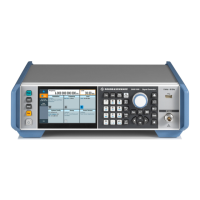Network operation and remote control
R&S
®
SMB100B
326User Manual 1178.3711.02 ─ 08
The instrument switches to "Remote LLO" state.
The [Setup] key is disabled.
7. To enable the [Setup] key, use the command >R.
8. To return to manual operation, see Chapter 11.12, "To return to manual operation",
on page 330.
Tip: Switching from manual operation to remote control and vice versa does not
affect the other instrument settings.
11.8.3 To establish the connection using socket communication
This section provides an example on how to establish a remote control connection over
Telnet client and a simple sockets-based program example that can be further devel-
oped.
See also Chapter A.1, "Telnet program examples", on page 601.
The telnet client transmits information unencrypted. Therefore, for sensitive information
we recommend that you use a client which supports secure protocols, like SSH.
In the following example, we assume basic knowledge of programming and operation
of the controller. You can find information on the interface commands in the corre-
sponding manuals.
To set up a Telnet connection
To control the software, only a Telnet program is required. The Telnet program is part of
every operating system.
1. On the instrument, make sure, that the LAN interface and "SCPI over LAN" are
enabled.
See Chapter 10.4.3, "Configuring LAN services", on page 255.
2. Connect the remote PC and the instrument in the same network.
See Chapter 3.1.7, "Connecting to LAN", on page 27.
3. On the remote PC, start the Telnet program.
Enter the socket address.
The socket address is a combination of the IP address or the hostname of the
R&S SMB100B and the number of the port configured for remote-control via Telnet.
Tip: The R&S SMB100B uses the port number 5025 for remote connection via Tel-
net.
To establish a remote control session over LAN

